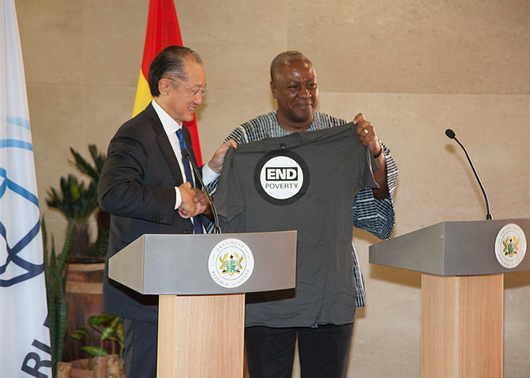
The World Bank Boss, Jim Yong Kim presenting the end-poverty-now T-Shirt to President John Mahama
Ghana on Friday became the venue for the global launch of the “End Poverty” campaign, which is an initiative by the World Bank Group to terminate extreme poverty globally by 2030.
Mr Jim Yong Kim, President of the World Bank Group, who is in the country to participate in high-level talks, launch a report on poverty in Africa, highlight Ghana’s progress toward ending extreme poverty, joined President John Dramani Mahama and other development partners and other stakeholders to observe the day.
Mr Kim in an address said the World Bank Group has set up a goal to end extreme poverty by 2030 and to boost shared prosperity for the bottom 40 per cent of the populations in developing countries.
He said currently much progress is being made towards achieving these total goals and applauded the world news of the fall in global poverty to below 10 per cent, which was the first time that the percentage of those living in extreme poverty has fallen into the single digits.
He also commended the government and people of Ghana for the tremendous progress made over the past two decades to end extreme poverty.
He said it is amazing that just in 20 years the country has been able to cut its poverty rate by more than a half, from 52 per cent in 1991 to 21 per cent in 2012.
Mr Kim however attributed the major reductions in extreme poverty levels to economic growth coupled with specific health and education interventions to improve the lives of the people in many countries such as Ghana.
He said school enrolments are now at 74 per cent across the continent, up from 55 per cent in 1990, with life expectancy rising six years in the last decade, and a reduction in the number of children dying from malaria reducing by 40 per cent since 2000.
He said all these are encouraging, but Africa could and must do much more to further reduce the current estimated 347 million people who were still living in extreme poverty in the continent.
“In the coming years, we also know that the world’s poor will be increasingly concentrated in Africa, and that poverty will likely remain the slowest and hardest in fragile countries, and rural areas,” he said.
Mr Kim was however hopeful that Ghana’s experience in reducing extreme poverty are valuable for the rest of the continent and the world, owing to the systematic pursuance of programmes such as structural transformation, which led to a shift out of agriculture that caused o an increase in non-agricultural self-employment and, to a lesser degree, wage jobs.
He also acknowledged the massive investment in education, and the growth in urban areas to ensure higher-paying jobs.
He however challenged Ghana to do more to address the macro-economic situation, improve energy supply to bring down the high cost of doing business, and asked African leaders to make tougher choices to grow their economies in ways that include women, the youth and all who are poor.
Dr Akinwumi Adesina, President of the African Development Bank, said Africans had become so used to poverty that they often think that it was a normal thing and said the continent is tired of being in the dark, and that its leaders must rise up to the task of becoming the net export of goods and services into the world market.
Source: GNA























